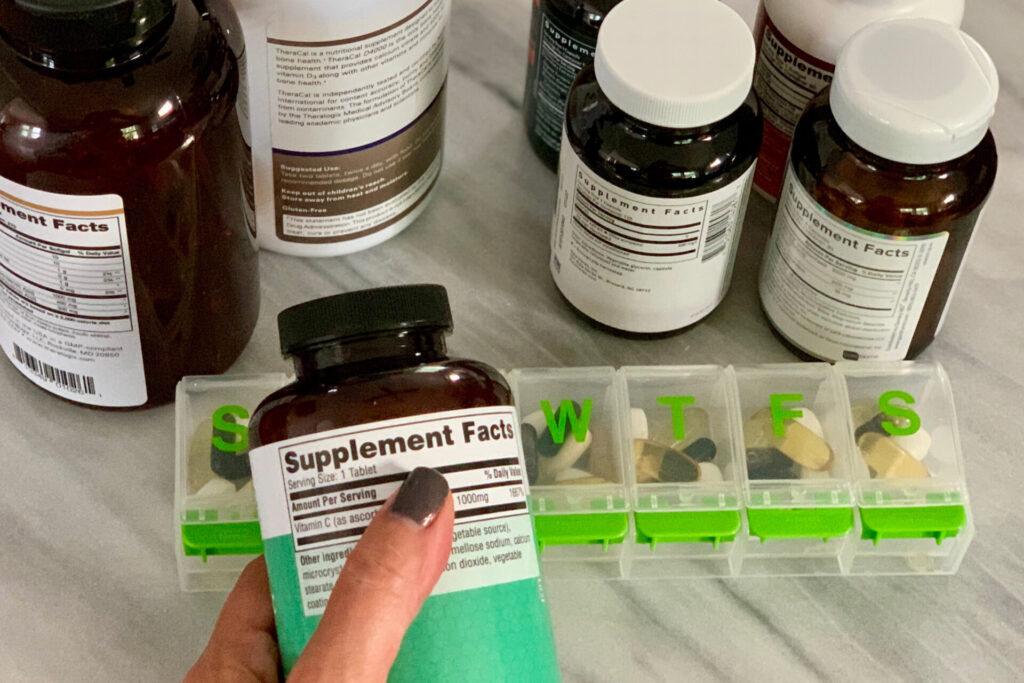The Truth About Vitamins and Supplements: What You Should Know
Vitamins and supplements have become popular in our search for well-being. You can easily buy them in almost any drugstore and pharmacy. Dietary additives are often promoted in fitness communities and on social media. However, how much do we actually know about them? Are they the answer to our good health, or just simply another marketing trick?
In this article, we’ll look at the truth about vitamins and supplements, from their advantages and possible risks to dosage recommendations, timing, and even harmful combinations. Whether you’re a wellness newcomer or an experienced enthusiast, you’ll find useful information here. Let’s plunge in!
Please keep in mind I am not a physician. The information provided is based on research, expert consensus, and reputable sources, but it should not replace individualized medical advice. Before adding any new supplement to your routine, always consult with your healthcare practitioner. For more in-depth details, check out resources like the National Institutes of Health (NIH) or the U.S. Food and Drug Administration (FDA).

Multivitamins: Beneficial or Mainly Marketing?
Why People Love Multivitamins
Multivitamins provide an easy way to receive essential vitamins and minerals in a single dose. This one-stop-shop approach appeals to busy people who may eat fast food or skip healthy food groups. These supplements and vitamins probably may help fill nutritional gaps, particularly in cases of specific nutrient deficiencies.
Benefits at a Glance
- Nutrient Insurance: They may act as a safety net for people who struggle to eat healthy meals.
- Energy & Vitality: Some people feel more energized, possibly as a result of correcting minor deficiencies.
- Psychological Boost: Let’s be honest—just knowing you’re doing something good might improve your mental state or mindset.
The Criticism
- Potential Over-Reliance: Taking too many multivitamins might lead to poor food habits and a false sense of security.
- Dosage Imbalances: Not all brands strike the right nutrient balance. Some might overload on certain vitamins (like B12) while skimping on others.
- Marketing Overdrive: Slick advertisements can make multivitamins sound like miracle cures, but actual results vary widely.
Expert Tip: If you feel you have a deficiency, a fast blood test can provide answers. According to NIH guidelines, knowing your particular nutrient levels allows you to target shortages more efficiently than a broad-spectrum multivitamin.

Fun Fact: Certain nature made vitamins companies produce specialized packs, like “women’s multivitamin” or a “natures made diabetes health pack” aimed at more targeted needs. Still, you should always read labels and discuss with your doctor if you have specific conditions—like breast cancer or diabetes—to ensure safety and efficacy.
Dietary Supplements: Pros, Cons & Emerging Trends
The word “dietary supplements” applies to a wide range of products, including single-nutrient products (such as Vitamin B1 thiamine), anti-cancer supplements, absorption vitamins designed for higher bioavailability, and pet health supplements such as cat vitamins or dog vitamins.
Pros
- Targeted Nutrition: Supplements like iron complex and Calcium + Vitamin D can help specific deficiencies or conditions.
- Immune System Support: Many rely on vitamins and the immune system connection (e.g., Vitamin C, Vitamin D) to safeguard against common ailments.
- Convenience & Personalization: Planning daily meals might be challenging due to busy lifestyles. Capsules, gummies, or vitamin liquids can complement an imperfect diet.
Cons
- Quality Control: Even with the FDA disclaimer for dietary supplements, the industry remains less regulated than prescription drugs. Products vary in purity and potency.
- Potential Side Effects: Overuse or incorrect combinations may result in headaches, stomach problems, or other significant issues. For example, some nerve supplements may interact with antidepressants, increasing the risk of serotonin syndrome.
- Hidden Ingredients: Some “miracle pills” may include unlisted chemicals. The risk increases if you buy from unknown sources or unreliable online retailers.

Dosage & Timing: Morning or Night?
Are you wondering “When is the best time to take vitamins in the morning or before bed?” The answer often depends on the type of vitamin or supplement, as well as your personal routine. Timing is often important.
- Morning for B Vitamins: Known for supporting energy metabolism, B-complex vitamins (including vitamin B1 thiamine and B12) can help jump-start your day.
- Fat-Soluble Vitamins with Meals: Vitamins A, D, E, and K dissolve better alongside dietary fats. Taking them with a meal that includes some healthy fats (like avocado or nuts) can enhance absorption.
- Evening for Calcium & Magnesium: These can help you relax, but using a nighttime fat burner with stimulants may be counterproductive if you want to sleep well. If you find they disrupt your stomach, adjust the timing accordingly.
- Avoid Mega-Doses: High doses of certain vitamins can lead to toxicity. Always stay within recommended daily allowances unless advised by a doctor.
Reference: For more on recommended daily intakes, see the Office of Dietary Supplements at NIH.

Dangerous Combinations: What Not to Mix
Even healthy-sounding supplements can become problematic if combined incorrectly.
- Calcium and Iron: Calcium limits iron absorption when taken together. If you need both, space them out by couple of hours.
- Vitamin K and Blood Thinners: Combining vitamin K with blood thinners, such as Warfarin, may decrease the efficiency of the medicine.
- Excessive Mineral Blends: Minerals such as zinc, copper, or magnesium can compete for absorption. Taking huge amounts of one may limit uptake of others.
- Stimulants with Sedatives: Taking a natural stimulant (like a high dose of caffeine-based supplements) along with sedatives (like melatonin) might clash, affecting sleep-wake cycles negatively.
Stay Safe Tip: Always share your full supplement list with your pharmacist or doctor, especially if you have chronic conditions or take prescription meds.

Potential Risks: Overdose Concerns
Though vitamins and minerals are important for health, overdoing them can be dangerous:
- Hypervitaminosis: Overconsumption of fat-soluble vitamins (A, D, E, and K) can lead to toxic levels in the body.
- Liver Stress: High-dose herbal compounds or fat-soluble vitamins may strain the liver over time.
- Organ Damage: Excessive Vitamin D can cause hypercalcemia, which harms the kidneys and other organs.
Remember: “More” isn’t always “better.” The NIH Office of Dietary Supplements provides upper intake levels for most vitamins and minerals. Checking these guidelines can save you from unintended harm.
Overdosing on vitamins turns a help into a hazard.
Can Supplements Replace a Well-balanced Diet?
The Short Answer: No
Supplements can help solve nutritional shortages, but cannot replace the synergy of entire foods. A single carrot has vitamins, minerals, fiber, and phytonutrients that function together in harmony, something a conventional supplement cannot replicate.
- Phytochemicals in Plants: Fruits and vegetables contain antioxidants and compounds that boost overall health.
- Nutrient Absorption: Whole foods improve vitamin absorption, increasing their effectiveness.
- Macros & Energy: Supplements don’t provide the proteins, healthy fats, or complex carbohydrates vital for daily energy needs.
CDC Note: The Centers for Disease Control and Prevention emphasizes that the best way to get the nutrients we need is through a diet rich in whole grains, fruits, vegetables, lean proteins, and healthy fats. Supplements are a complementary measure, not a primary one.

Eating well is the first step; supplements are merely the second.
Choosing High-Quality Vitamins & Minerals
Key Factors to Consider
- Look for Quality Seals: Certifications from organizations such as the USP or NSF International indicate that the supplement has been verified for purity.
- Check Manufacturing Standards: Although the FDA doesn’t regulate supplements as strictly as drugs, they do require Good Manufacturing Practices (GMP). Make sure your chosen brand follows them.
- Research the Brand: Read reviews, look at third-party lab testing, and research the ingredient list to ensure transparency. Avoid using generic “proprietary blends.”
- Beware of Fads: Claims of miracle weight loss or “detox” are huge red flags. Stick with evidence-based options.
- Consult Professionals: Pharmacists and doctors can provide personalized advice, especially if you have pre-existing conditions or are on medications.
Pet Health Tip: If you’re considering vitamins for dogs (like joint support or coat-improvement formulas), consult your vet first. Pets need different dosages and forms to avoid toxicity.
Health is a relationship between you and your body.
Medical Consultation: Essential for Personalization
Your best strategy is to get blood tests and review your health history before starting any supplement regimen. Vitamins and minerals work differently for each person, influenced by factors like genetics, age, diet, and overall health.
- Pinpoint Deficiencies: Testing identifies actual deficits (like Vitamin D or iron), ensuring targeted and effective supplementation.
- Check for Interactions: Your doctor can warn you about potential issues with prescription meds.
- Monitor Levels: Regular follow-ups can help you determine if your selected regimen is effective or needs to be adjusted.
Where to Learn More: Visit reputable sources like the NIH’s Dietary Supplement Fact Sheets and CDC’s Nutrition Portal to broaden your knowledge.

Popular Vitamins & Supplements: Benefits & Side Effects
Below is a curated list of widely used vitamins and supplements, known for their purported health benefits.
As you know already I am not a physician. The choices below, as well as any potential Amazon affiliate links, are based on market popularity and reviews from customers. Always consult with a healthcare practitioner, since individual needs can vary significantly.
Vitamin B Complex
- Key Benefits: Supports energy metabolism, brain function, and red blood cell production.
- Possible Side Effects: High doses can lead to skin flushing or mild digestive upset, particularly from B3 (niacin).
Melatonin
- Key Benefits: Aids in regulating sleep-wake cycles, potentially improving sleep quality and reducing jet lag.
- Possible Side Effects: Daytime drowsiness, vivid dreams, mood changes if taken at higher doses or if combined with other sedatives.
Vitamin C
- Key Benefits: Boosts immune function, acts as an antioxidant, and aids in iron absorption.
- Possible Side Effects: High doses (typically above 2,000 mg/day) can lead to diarrhea or stomach cramps.
Vitamin D
- Key Benefits: Essential for bone health, may support immune function, and mood regulation.
- Possible Side Effects: Excess intake can cause hypercalcemia, leading to kidney problems. Aim for recommended doses, especially in areas with limited sunlight.
Vitamin E
- Key Benefits: Powerful antioxidant that supports skin health and immune function.
- Possible Side Effects: Very high doses may increase bleeding risk, particularly if you’re on blood thinners.
Iron Complex
- Key Benefits: Vital for producing red blood cells and preventing anemia.
- Possible Side Effects: Can cause constipation, dark stools, or stomach discomfort if dosage is too high.
L-Tryptophan
- Key Benefits: An amino acid precursor to serotonin, which can help support mood balance and better sleep.
- Possible Side Effects: Mild gastrointestinal issues, drowsiness if taken in high quantities.
5-HTP
- Key Benefits: Another precursor to serotonin; may aid in mood regulation and sleep quality.
- Possible Side Effects: Nausea, heartburn, and in rare cases, if combined with certain antidepressants, a risk of serotonin syndrome.
Alpha-Lipoic Acid
- Key Benefits: Acts as a potent antioxidant and may support metabolic function and nerve health.
- Possible Side Effects: Typically mild; some may experience headaches or stomach upset.
Chromium
- Key Benefits: May assist in regulating blood sugar by improving insulin sensitivity.
- Possible Side Effects: Dizziness, upset stomach; more research is needed to confirm efficacy and long-term safety.
Magnesium
- Key Benefits: Crucial for muscle and nerve function, bone health, and relaxation. Certain forms (like citrate) are known to help with constipation.
- Possible Side Effects: Loose stools or diarrhea if you consume too high a dose or a form your body doesn’t tolerate well.
Ginkgo Biloba
- Key Benefits: Traditional herb touted for improving circulation and cognitive function.
- Possible Side Effects: Headaches, palpitations, or increased bleeding risk. Monitor closely if you’re on blood thinners.
A Few Other Popular Picks
- CoQ10: Often taken for heart health and cellular energy production.
- Omega-3 Fish Oil: May support cardiovascular health, reduce inflammation, and promote brain function.
- Collagen Supplements: Often used for improved skin elasticity and joint support.
Putting It All Together
Vitamins and supplements can bolster a healthy lifestyle by filling specific nutrient gaps, supporting various body functions, and improving overall wellness. However, they should complement rather than substitute a balanced diet. Real foods offer a rich tapestry of nutrients, fiber, and phytochemicals that pills can’t fully replicate.
Key Takeaways:
- Know Your Needs: Get tested to identify deficiencies.
- Consult Experts: A healthcare professional can help tailor a supplement plan to your unique biology.
- Beware Over-Supplementation: High doses can be harmful.
- Quality Over Quantity: Research brands and look for reputable seals or third-party testing.
- Stay Informed: Health science is evolving. Keep up with reputable sources like the NIH or FDA to make educated decisions.
A pill can fill a gap, but not replace the entire bridge.




